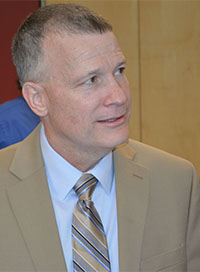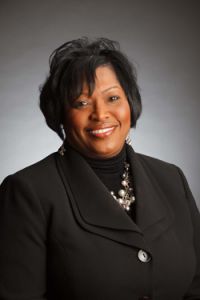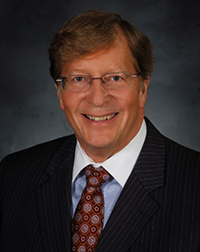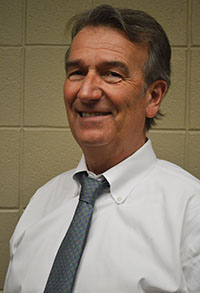Wednesday’s shooting in a Florida high school that killed at least 17 people sent shudders through students, staff and parents in West Michigan, as the nation once again deals with a mass shooting in a school. The massacre at Marjory Stoneman Douglas High School in Broward County brought to more than 400 the number of people who have been shot in more than 200 such shootings since the 2012 murder of 20 first-graders and six adults in Newtown, Connecticut, according to the nonprofit Gun Violence Archive.
Expelled student Nikolas Cruz, 19, was charged Thursday with 17 counts of premeditated murder using a semi-automatic rifle legally purchased. His rampage revived issues of school security, mental health and access to deadly weapons and brought to mind the horrific Columbine massacre of 1999.
School News Network asked local superintendents to reflect on two questions: what their schools have done to protect students and staff from the possibility of a shooter; and what else needs to be done at the state and national levels to reduce the incidence of mass school shootings. They responded in interviews or prepared statements.

Ron Caniff, Kent ISD
“As a response to the first question, the issue requires a two-pronged approach: prevention and preparedness. What’s the root cause of the action or behavior? School districts in our area are doing a great job with addressing underlying mental health concerns of students. Resources are best invested in strengthening relationships with all students and building connectedness, but for those who need extra assistance, it’s essential to provide that for them on a proactive basis.
“Preparedness is also absolutely critical. School staff undergo training for active shooter scenarios but obviously hope and pray that they will never have to experience that crisis. In these situations, mere seconds have the opportunity to save lives, so staff members need to know how to react and respond ahead of time so their training kicks in. Schools are also addressing security issues through design and protocols, such as secure vestibules, surveillance cameras, and restricting visitor access.
“As for the second question regarding state and national policy, in Michigan, it seems policy makers believe that the solution may in part rest with allowing open carry of pistols in schools. I wholeheartedly disagree with that approach.
“It’s common knowledge that these tragedies are occurring in America at a rate that far, far exceeds other countries. Why is that? Based on what I’ve read and heard, the biggest contributing variable is the abundance and accessibility of guns. If you don’t believe this statistic, just Google it.
“So for me, the answer is simple: we need fewer guns, not more of them.”

Teresa Weatherall Neal, Grand Rapids Public Schools
“First and foremost, our thoughts and prayers go out to all the students, parents, staff, and the entire Broward County community.
“Any time there is a tragic incident like this, it is good to reflect on all the training, technology, policies, procedures, and facility-related measures that our district has in place to ensure safe and secure school environments.
”We at GRPS take great pride in being a national leader on school safety and security. Our own chief of staff and executive director of public safety and school security, Mr. Larry Johnson, is the chair of the board of directors for the National Association of School Safety and Law Enforcement Officers. In 2008, Mr. Johnson helped secure a federal grant from the U.S. Department of Homeland Security to implement a comprehensive training on critical incidents and crisis management.
“The trainer model led GRPS to host a series of trainings for staff from public and private districts throughout the region. This grant also led to an assessment of egress points at our schools, complete with installation of new entryway identifications. GRPS conducts multiple school safety trainings and school safety drills throughout the year.
“Additionally, thanks to the voter-approved bond (for $175 million in 2015), GRPS is in the process of implementing more than $10 million in facility and security improvements including renovations to main offices/entryways, security cameras, and other security technology.”

Michael Shibler, Rockford Public Schools
Shibler sent an open letter to district staff and families (as did other superintendents) noting the many steps the district has taken to increase safety. Those include the Developing Healthy Kids initiative supporting mental health awareness and suicide prevention; student peer listeners to help classmates; and the statewide OK2Say system for reporting suspicious behavior or bullying. The district’s nine security personnel vigilantly monitor school buildings, he said.
Shibler also pointed to the $11 million spent on security upgrades from a 2014 bond approval, including first-floor shatterproof glass and entryway vestibules that require visitors to be buzzed into the main office. He said the vestibules would have prevented the Florida incident from happening here because a shooter would not be allowed into the building.
“If this guy came into our vestibule, he would certainly be recognized as a person who was expelled from our school” and therefore not admitted, Shibler said.
Nor would anyone be allowed into a building carrying a weapon, as Rockford schools are designated gun-free zones, he said. He supports a complete legal ban on carrying weapons into schools or other public arenas by anyone other than law enforcement, and testified before a Senate committee before the full body in November approved a bill allowing concealed-carry in schools. The bill is now before the House of Representatives.
“We have certainly contacted our representatives to let them know this is unacceptable,” he said. “I can’t imagine they’ll bring it up now.”
However, he sees the No. 1 issue behind school shootings as mental health, which he called an illness that “needs to be treated, just like heart disease.” For students, he added, the problem has been exacerbated by technology.
“Kids today can be bullied and harassed through a cell phone, by people who have no respect for dignity, or courage.”

William Fetterhoff, Godwin Heights Public Schools
Fetterhoff said security and training in the district are consistent with what many schools have implemented, including secured entrances, security cameras and mandated school lockdown drills.
But he doesn’t think facility preparedness is at the center of the issue. “First, prayers to the families,” he said, in reaction to Wednesday’s shooting. “That’s 17 more mothers who lost their babies.”
This and other school shootings should no longer be a matter of politics, Fetterhoff said.
“We need to not politicize this and instead look at it as a moral issue in our country,” he said.
Fetterhoff said schools need more financial resources to build relationships in communities, and provide students with access to mental health support and counseling. Youth are faced with huge amounts of pressure and mental illness is rampant, he said. He said the Florida shooter showed many disturbing behaviors.
“The schools need to become a platform for providing and acknowledging support for students to know it’s OK to talk about how you are feeling and what you are thinking,” he said. “We understand that necessity as our communities lean on us.”
Teaching today requires much more than instruction and schools need financial support in attracting “the best teachers that understand teaching today is a holistic endeavor.”
“And for the goodness of society we need to identify individuals (with mental health issues that could pose a danger to others) and pass laws and legislation so they cannot accrue weapons,” he said.
CONNECT
SNN Story: Schools Spend Big to Tighten Security: ‘We Live in a Different World’









